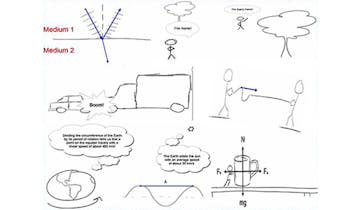
Good to know
Save this course
Reviews summary
Ap physics 1 exam prep
Activities
Review foundational physical science knowledge
Show steps
Refreshes foundational knowledge that is needed for success in this course.
Show steps
-
Read through past notes and study materials.
-
Complete practice questions and problems.
-
Review key concepts and formulas.
Review Serway and Jewett's Principles of Physics textbook
Show steps
Provides a comprehensive review of the key concepts covered in the AP* Physics 1 course.
Show steps
-
Read through relevant chapters and sections.
-
Complete end-of-chapter problems and exercises.
-
Summarize key concepts and equations.
Complete practice problems and simulations
Show steps
Provides opportunities to apply the concepts learned in class and improve problem-solving skills.
Browse courses on
Physics Simulations
Show steps
-
Find practice problems and simulations online or in textbooks.
-
Attempt to solve the problems and simulations independently.
-
Check your answers and identify areas for improvement.
Show all three activities
Review foundational physical science knowledge
Show steps
Refreshes foundational knowledge that is needed for success in this course.
Show steps
- Read through past notes and study materials.
- Complete practice questions and problems.
- Review key concepts and formulas.
Review Serway and Jewett's Principles of Physics textbook
Show steps
Provides a comprehensive review of the key concepts covered in the AP* Physics 1 course.
Show steps
- Read through relevant chapters and sections.
- Complete end-of-chapter problems and exercises.
- Summarize key concepts and equations.
Complete practice problems and simulations
Show steps
Provides opportunities to apply the concepts learned in class and improve problem-solving skills.
Browse courses on
Physics Simulations
Show steps
- Find practice problems and simulations online or in textbooks.
- Attempt to solve the problems and simulations independently.
- Check your answers and identify areas for improvement.
Career center
Physics Teacher
Astronomer
Geophysicist
Nuclear Engineer
Materials Scientist
Mechanical Engineer
Aerospace Engineer
Electrical Engineer
Civil Engineer
Chemical Engineer
Biomedical Engineer
Computer Scientist
Data Scientist
Financial Analyst
Management Consultant
Reading list
Share
Similar courses
OpenCourser helps millions of learners each year. People visit us to learn workspace skills, ace their exams, and nurture their curiosity.
Our extensive catalog contains over 50,000 courses and twice as many books. Browse by search, by topic, or even by career interests. We'll match you to the right resources quickly.
Find this site helpful? Tell a friend about us.
We're supported by our community of learners. When you purchase or subscribe to courses and programs or purchase books, we may earn a commission from our partners.
Your purchases help us maintain our catalog and keep our servers humming without ads.
Thank you for supporting OpenCourser.


